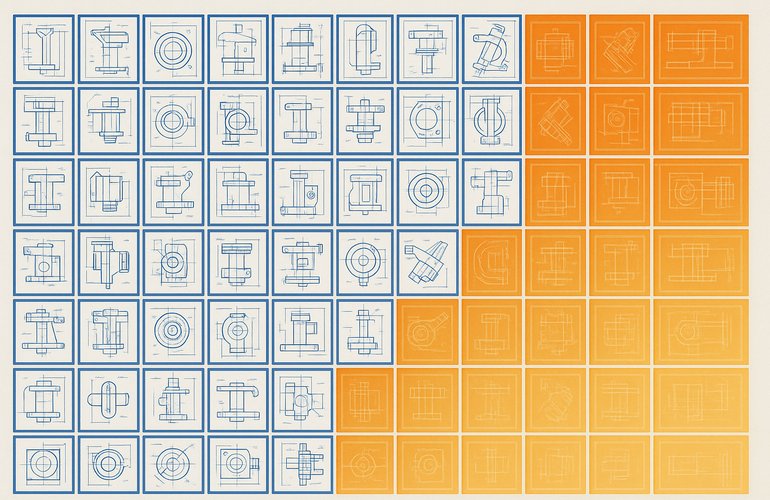Image credit: Generated by ChatGPT/DALL·E
A survey of 250 engineering leaders at U.S. and European manufacturing companies found that 95% believe full AI adoption by design teams is critical or important in the next 12 to 24 months. The poll, commissioned by CoLab, covered leaders in automotive, consumer hardware, heavy machinery, industrial equipment and medical devices at firms with 1,000 to over 10,000 employees.
Every respondent expected AI to speed up design reviews, with potential gains of 2.8 times. Leaders said 73% of drawing reviews could be automated using AI trained on company standards. This comes as 70% of teams reviewed 30,000 to over 50,000 drawings organization-wide in the past year.
The results track with AI’s growing role in broader R&D. In life sciences, 68% of professionals used AI in 2024, up from 54% in 2023, per a Pistoia Alliance survey. McKinsey analysis shows AI could double R&D productivity in industries like biopharma and electronics, unlocking $360 billion to $560 billion annually. A Foundry survey of 902 IT leaders found 61% expect generative AI to improve product development, with 40% of IT teams partnering with R&D on AI projects.
In the engineering poll, 95.6% of leaders said following company standards is critical or important, but only 55% are documented, current and regularly used. “There were a few instances where we had created a standard and, a few years later, I noticed people not even knowing the standard existed,” said David Sellers, senior director of engineering at Hoshizaki America, a maker of ice and refrigeration equipment, quoted in the press release.
“Only about half of company standards are documented, up to date, and consistently referenced today. AutoReview closes that gap – it pulls directly from a company’s own rules, whether they live in a PDF, Excel sheet, or SharePoint folder, and checks designs against those standards automatically,” said Adam Keating, co-founder and CEO of CoLab, in a press release. “Now, we’re seeing teams start to be motivated to document and update standards, because they know they’ll actually get used.”
Change management was a top issue for 19.6%. It’s about building “trust,” Keating said. “AutoReview isn’t replacing engineers; it’s giving them instant access to their organization’s historical technical know-how so they can make more informed decisions.”
These obstacles echo R&D challenges. Pistoia found 52% of life sciences pros cite low-quality data as the main barrier in AI projects in a 2024 survey. Another 38% pointing to non-FAIR data and 28% distrusting AI. Foundry reported 47% of IT leaders see integration and security as hurdles, and 37% lack in-house expertise. McKinsey noted a 20-point spike in AI adoption after ChatGPT, but half of firms used analytical AI pre-generative era.
Still, 96% of engineering leaders plan 2D AI reviews in one to two years, half in six months. CoLab launched AutoReview in June, an AI system that automatically reviews 2D drawings and 3D models.
Read the full article from the Source




